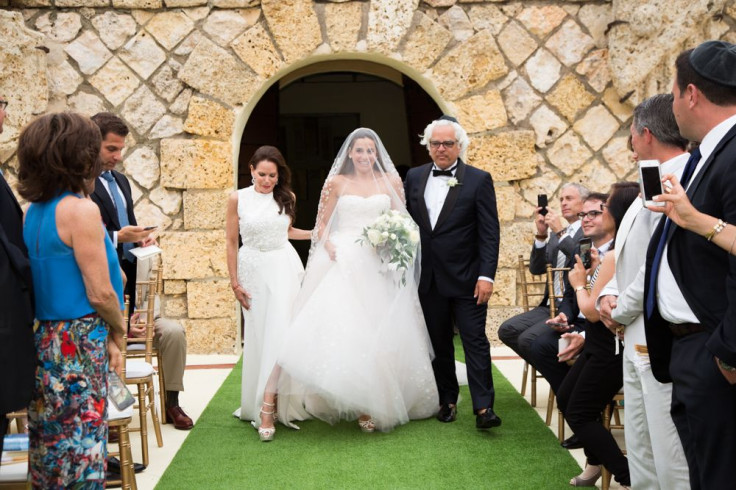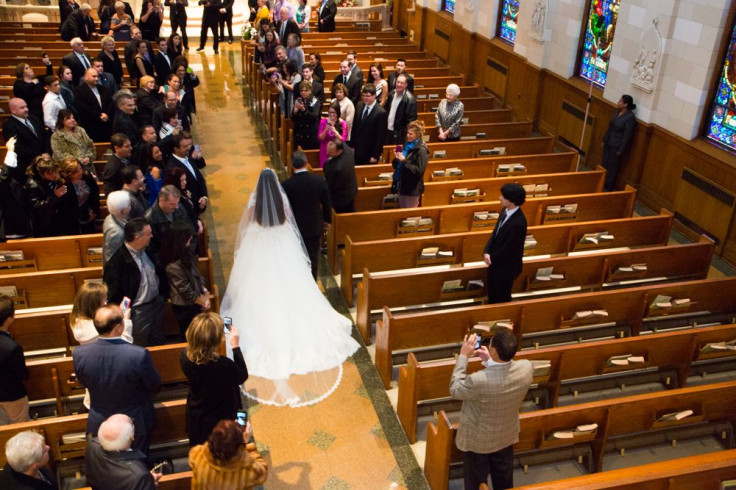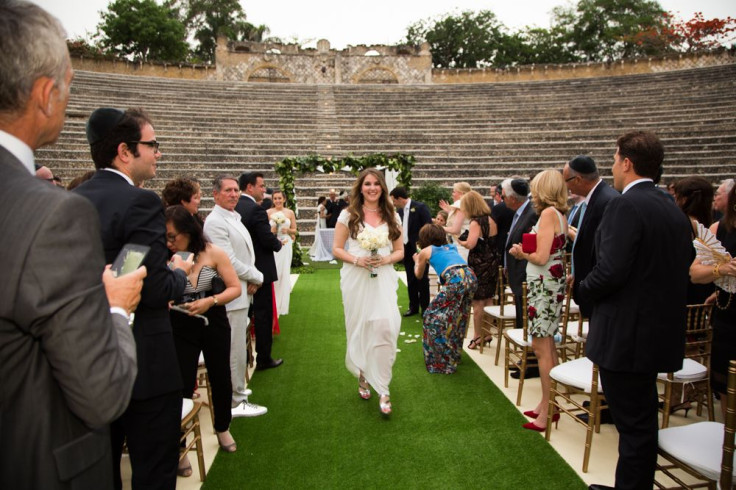The No Cell Phone Wedding: Why Brides And Grooms Want You To Forget Instagram And Stop Taking Selfies

Samantha Heinrich met her fiance, Andrew Bosco, at a bicycle race in Wisconsin. They are both avid cyclists. Bosco, 26, repairs bikes for a living, while Heinrich, 28, is a hobbyist graphic designer. After two years and three months as a couple, they’re getting ready to tie the knot.
“To be committing our lives to one another is the biggest commitment we could ever make, something we’d like our guests to actually be there for,” Heinrich said, emphasizing the phrase, “be there.” Firm believers in the importance of being present in body and spirit, Heinrich and Bosco have declared war on one of the great distractions of our time: They are not allowing smartphones at the ceremony.
No ifs. No buts. No phones.
And they’re not the only ones taking this stand. From brides to photographers to priests, a backlash is forming against the great destroyer of wedding ceremonies. The smartphone sits at the center of almost everybody’s mobile life, so it’s only natural it would also infiltrate the modern wedding ceremony. But when guests are snapping selfies and posting their photographs on Facebook rather than focusing on what’s going on, it’s an aggravation for those who worked so hard to make the day a success.
And it’s not just a nuisance: The proliferation of phones at weddings is ruining the work of paid professionals who are tasked with capturing the perfect photos but all too often find themselves obstructed by aunts and uncles thrusting their devices in the air.
“The worst is when the bride comes down the aisle,” said Kenny Pang, a wedding photographer based in New York. “People will jump in front, stretch their arm out. I can’t move out of position and tell them to move back!”
Thankfully, Pang has noticed a sharp uptick in priests and rabbis requesting that no cell phones be used during the ceremonies. The Rev. Curtis Farr, assistant rector at St. James’ Episcopal Church in West Hartford, Connecticut, is one of them. Before ceremonies, he always asks people to put away their phones and tablets.
“There is a bounty of meaning in the words and movements of the liturgy, and that meaning ought to be fully embraced in the flesh without the hindrance of an electronic leash,” Farr said. “I think it is a loving gesture to put away the phone and experience the ceremony to the fullest. Plus, the iPhone shot from seven rows back is going to look terrible anyway.”

Heinrich first noticed how obsessed people are with their phones when she went on a weeklong trip to Spain in June 2013. She and 16 others represented the U.S. in a para-cycling world-cup tournament, and while she was there something strange happened. “You see these 16 Americans on their phones constantly, and then you walk outside and you see Spanish people not on their phones,” Heinrich said. “It kinda showed the extremes.”
Heinrich, over the moon about representing her country on the international stage, didn’t care at the time. When she returned home, though, it suddenly occurred to her: In the fast-paced lifestyle that surrounded her, people were glued to their devices. It took a trip halfway around the world for her to notice.
In contrast, Bosco remembers vividly the time when he noticed. It was in 2013, while he was living with his sister. “After my first nephew was born, he would be playing and his mom would be on her phone, and I’d be playing with him but she was scrolling on Facebook,” Bosco said. “I don’t know why it bothered me, but it did. It kind of upset me a bit, so when it came to the wedding I was like, ‘Well, I don’t want people to not be there.’”
It’s a bold move. Unplugged ceremonies are an uphill struggle against a culture dead set on recording everything, even if the moment is being recorded by everybody else around them. Photographers lament beautiful group shots lost to a sea of cameras standing on either side. When it’s time to click the shutter, nobody knows where to look. Eyes dart off in all different directions, and the photo is ruined.
“The worst ones are the people taking selfies at the ceremony,” said Jonathan Hons, who works with his wife, Brittani, at The Hons wedding photographers based in Florida. He remembers one instance where the bride was walking down the aisle, with four selfie sticks stuck straight in the middle to record the big moment. “It’s just dangerous,” he said.

St. James’ Episcopal Church’s Farr holds a much stronger view. “I have yet to experience a selfie stick at a wedding, but I can tell you right now that I won’t tolerate that s---,” he said. “Keep it at the reception. Actually, you know what? Just lose the selfie stick altogether.”
After the couple reached their mutual decision about the smartphone ban, Heinrich began to read accounts of what appears to be a growing movement. She read more and more about “unplugged” ceremonies, about couples who made similar decisions. She saw wedding photographers who’d written blog posts, complete with shots ruined by phones. “I didn’t want that to happen to our photos,” she said. She came away feeling, more than ever, that they’d made the right decision.
Pro-Tech, Anti-Tack
But this isn’t some Luddite movement against technology. Rather, it’s about wanting their guests to focus on the ceremony, to not miss one of the biggest moments of their lives. “To see them on their phones during our ceremony would feel ... as if they didn’t really want to be there in the first place,” Heinrich said.
Heinrich and Bosco are putting their feet down during the planning process, and they’re not the first couple to do it. “Couples are indeed becoming more aware and sensitive to the idea of guests taking photos during their wedding and posting them on social media,” said Martine Boursiquot-LaConte, a wedding planner at This Modern Love Events based in Connecticut.
Boursiquot-LaConte pointed to the instant-sharing aspect as a major point of contention. “It seems like more and more couples are wishing to have their nuptials remain as private as possible and want to have control over what kinds of photos are shared,” she said.
Why does it matter so much? Brooke Lagstein, who with her husband, Eric, runs Be Creative Photography based in New Jersey, explained that it’s as much about aesthetics as it is about privacy. “Some brides don’t want photos revealed without seeing themselves, like if it catches them at a bad angle,” she said. “The bride wants to reveal the photos.”

Heinrich and Bosco have also told their photographer, Grace Kathryn, about the decision to go unplugged. She’s ecstatic. “This is fantastic news!” she said. “I seriously cannot express how happy I am every time I learn a ceremony will be unplugged.”
As the big day draws closer, Heinrich has a three-pronged approach to enforcing the rule: First, the rule is included in the information on the wedding website. Second, the officiant will inform everybody before the procession starts. And third, if it’s needed, the officiant will say it again once everybody is seated. It’s a strong plan that could potentially ruffle some feathers, but if there’s any relatives or friends who don’t agree with their plan, Heinrich said they haven’t told her.
Bosco’s mom, who isn’t on social media but loves her smartphone, was somewhat dismayed to learn that she wouldn’t get to take her own photos to show her friends. “She told me last night: She said, ‘I don’t wanna have to wait two weeks or more to get a picture!’” So Bosco is planning to make a special request to Grace: one or two photos, printed out as soon as possible, so his mom has something to show people.
The Needs Of The Many
It’s an ongoing battle with no clear outcome. Photographers want to do their jobs, priests and rabbis want everybody to experience the ceremony, and couples want everything to go perfectly. But guests have these devices, they want to capture a special day, and they like sharing them with people who couldn’t make it.
Some photographers have learned to embrace it. If there’s a phone in the shot, then maybe it adds something. “I think it actually enhances some photos,” said New York-based wedding photographer Bryan Sargent. “Couple and guests, they love it! They think it’s hilarious, a nice little time stamp.”
As the war wages, maybe the future of smartphone etiquette lies somewhere in the middle. Where it is socially acceptable, such as for fun personal shots that don’t intrude on the proceedings, the phone will stay. Otherwise, put the phone away and relax.
Next month, Heinrich and Bosco will say their vows at a ceremony in Santa Barbara, California. Pages and pages could be written about the etiquette, what’s acceptable, what isn’t acceptable. But for the prospective newlyweds, the point is that two people are getting married, and they have made a simple request of their guests. “Those that don’t agree with it may talk about how silly or ridiculous it is -- and may even take photos anyways -- but it’s what Andrew and I want,” she said.
“I would hope that all of the guests Andrew and I have invited respect us and our wishes enough to put their phones away for half an hour, to not only see the love but to feel it as well.”
© Copyright IBTimes 2024. All rights reserved.












